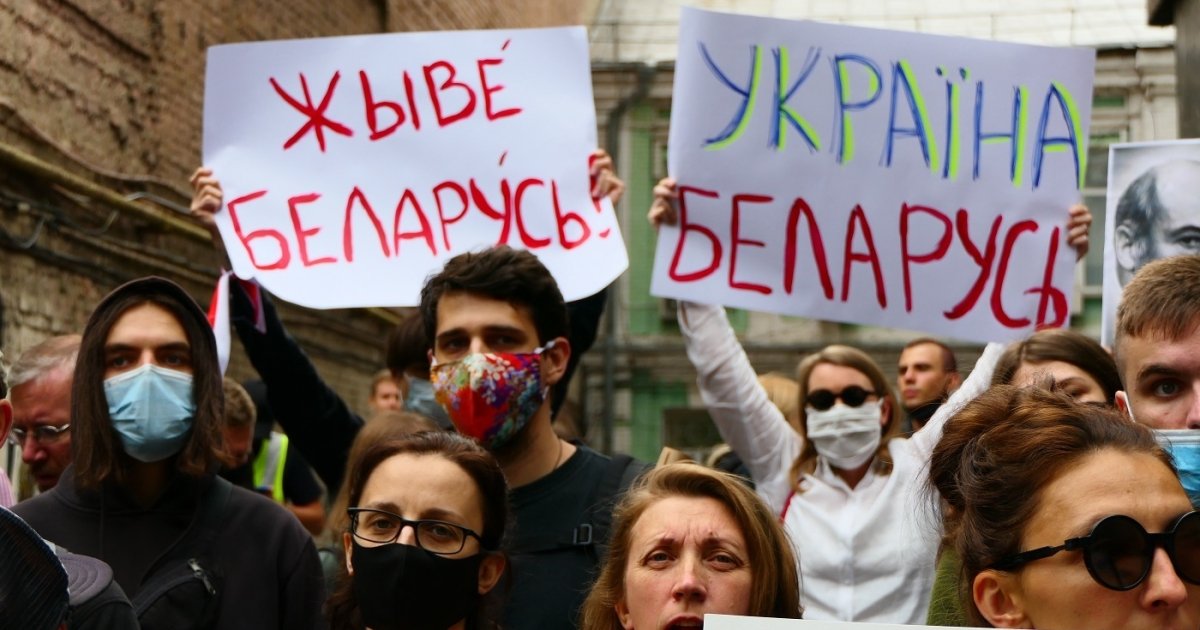Relations between Ukraine and Belarus in the context of the Russo-Ukrainian war

In February 2022, the Russian Federation began a large-scale invasion of Ukraine, which also included attacks from Belarusian territory. This led to a significant deterioration in relations between Ukraine and Belarus in economic, political and security spheres. Although Kyiv perceives the Minsk regime as threatening, today it maintains a very limited dialogue on practical issues and takes a rather cautious stance towards cooperation with Belarusian democratic forces. This cautious approach is motivated both by Ukraine’s security concerns and by Kyiv’s lack of a strategic vision regarding Belarus.
The erosion of economic cooperation
Before 2022, Ukraine’s foreign policy strategy towards Belarus was initially aimed at using trade to prevent Russian interference in Belarusian sovereignty. When the EU imposed sectoral sanctions on Belarus in mid-2021, Ukraine not only became the main market for Belarusian petroleum products and electricity exports, but also provided Belarus with an opportunity to circumvent the sanctions through trade.
However, when Belarus became a bridgehead for Russia’s large-scale invasion, Ukraine changed course and parted with strategically important imports from Belarus, especially petroleum products. The involvement of the Lukashenko regime in the Russian aggression made it impossible for Kyiv to maintain trade relations with official Minsk at the same level. As a result, bilateral trade collapsed from a peak of $6.9 billion in 2021 to $1.6 billion in 2022, a sharp decline. Data from 2023 show that bilateral trade continued to decline in the first seven months of this year, amounting to only $13.8 million, highlighting the collapse of economic cooperation.
Political relations at a standstill
Since February 2022, political relations between Ukraine and Belarus have reached a historic low. Communication is minimal and diplomatic disengagement is occurring. De jure, both states maintain diplomatic relations, but practical engagement has been severely curtailed. Ukrainian and Belarusian ambassadors have been recalled, Ukraine reduced its embassy staff in Minsk to just five, and Belarus evacuated its diplomats from Ukraine.
Ukraine maintains diplomatic relations with Belarus for three reasons. First, Moscow and Kyiv use the Minsk channel to exchange notes and transfer legal and consular documents. Second, Belarus is one of the few routes through which Ukrainians from the occupied territories can reach the areas controlled by the Ukrainian government. And third, the presence of Ukrainian diplomats on Belarusian soil is a signal to Minsk that official Kyiv will not use military force against Belarus.
Given the lack of trust and formal diplomatic cooperation at the highest level, most communication takes place through intelligence services or other closed channels. Kyiv’s goal is to influence Belarus’ political leadership and contain the regime’s security threats.
Development of the role of the Lukashenko regime in the war
Since mid-2022, the Minsk regime’s direct threats against Ukraine have decreased, mainly due to the reduced Russian military presence in Belarus compared to the build-up before the large-scale invasion of Ukraine. There are currently about 2,000 Russian soldiers on Belarusian territory, mainly tasked with maintaining Russian aviation and radio equipment.
However, Belarus’ role in the Russian-Ukrainian conflict has changed significantly. Originally Belarus served as a base for Russian military operations, today it is an important supplier of military equipment, ammunition and military components for Russia.
Belarus is also involved in Russia’s psychological and information operations that precede each new phase of the Russian-Ukrainian war. For example, leaked Pentagon documents revealed that in the first half of 2023, Russia tried to create the impression among Ukrainian intelligence of a possible second offensive from Belarus.
Similar warlike processes are currently taking place in connection with the Russian offensive in eastern Ukraine. The Lukashenko regime is conducting military exercises and accusing the Kyiv authorities of deploying saboteurs on its territory. These factors, coupled with mobilization, training and statements about preparations for war, are probably aimed at putting pressure on Ukrainian society and the military-political leadership.
Low probability of serious escalation
Nevertheless, the likelihood of a resumption of missile or drone attacks or a renewed offensive from Belarusian territory is rather low. Turning Belarus into a war zone would be detrimental both to Lukashenko, who, like any autocrat, is primarily guided by the interest in preserving his regime, and to Russia, since its ability to obtain necessary components and petroleum products from Belarus would be undermined by Ukrainian attacks on defense facilities and refineries on Belarusian soil.
In addition, Ukraine is not only better prepared for a possible escalation, but also has Belarusian volunteer units, in particular the Kalinouski Regiment. The Minsk regime considers these volunteers a potential threat and a source of destabilization in the country. For this reason, the Belarusian Interior Ministry has created several anti-terrorist units, while the Belarusian KGB has labeled the volunteers as extremists and initiated criminal cases against their family members.
Restrained attitude towards the Belarusian Democratic Forces
While Belarusian volunteers are seen as an integral part of a military-political strategy to deter the Lukashenko regime, Kyiv has been more cautious about working with Belarusian activist and opposition leader Svetlana Tikhanovskaya and her team. Security remains Kyiv’s top priority, and Ukrainian authorities are avoiding provoking Lukashenko or jeopardizing fragile relations with official Minsk by working more closely with Belarusian democratic forces, which they see as having limited ability to deter the Minsk regime or provide significant support to the Ukrainian war effort.
Despite these challenges, continued communication between Ukrainian parliamentarians and representatives of the United Transitional Cabinet of Belarus, the government in exile, as well as Kyiv’s appointment of a special envoy to Belarus responsible for engaging democratic forces, could create opportunities for closer ties between Kyiv and the Belarusian democracy movement in the future and help Kyiv in dealing with the leadership in Minsk.
Kyiv must rethink its current approach towards Belarus
Ukraine has successfully deterred the Lukashenko regime. However, such a limited approach cannot eliminate the threats and ensure lasting security and stability on Ukraine’s northern border. Ukraine needs to pursue a more proactive and thoughtful policy towards Belarus, including a wide range of tools. This would increase Kyiv’s flexibility in mitigating negative impacts and help it seize new opportunities to support the Belarusian democracy movement and in dealing with the leadership in Minsk.
The opinions expressed in this article are solely those of the author and do not reflect the views of the Kennan Institute.



